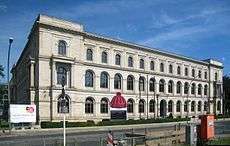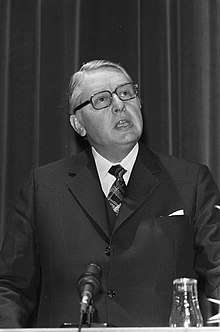Federal Ministry of Transport and Digital Infrastructure
| Bundesministerium für Verkehr und digitale Infrastruktur (BMVI) | |
 | |
 | |
| Agency overview | |
|---|---|
| Formed | 20 September 1949 |
| Jurisdiction | Government of Germany |
| Headquarters |
Invalidenstraße 44, Berlin 52°31′46.58″N 13°22′42.10″E / 52.5296056°N 13.3783611°ECoordinates: 52°31′46.58″N 13°22′42.10″E / 52.5296056°N 13.3783611°E |
| Employees | 1300 |
| Annual budget | €27.85 billion (2018)[1] |
| Minister responsible |
|
| Website | http://www.bmvi.de |

The Federal Ministry of Transport and Digital Infrastructure (German: Bundesministerium für Verkehr und digitale Infrastruktur), abbreviated BMVI, is a cabinet-level ministry of the Federal Republic of Germany.
The Ministry itself has about 1300 employees. At the top is the Federal Minister, and there are three Parliamentary Secretaries and two civil servant undersecretaries. The ministry oversees 63 downstream agencies and authorities[2] where around 25,000 people work[3]
The agency was formed through the merger of the former Federal Ministry of Transport and the Federal Ministry of Regional Planning, Building and Urban Development, both established in 1949. The merged ministry was at first named Federal Ministry of Transport, Building and Housing until it adopted the name Federal Ministry of Transport, Building and Urban Development (BMVBS) in 2005. The current BMVI originated by renaming the BMVBS through an organizational decree by the Merkel III Cabinet on December 17, 2013.
Agencies
Subordinate agencies include:
- German Federal Bureau of Aircraft Accident Investigation
- Federal Bureau for Maritime Casualty Investigation
- The Federal Maritime and Hydrographic Agency (German: Bundesamt für Seeschiffahrt und Hydrographie (BSH)) located in St. Pauli, Hamburg, provides among other things information of all matters of maritime shipping, to special funding programmes, law of flag, certification of mariners and information of the coasts and coastal waters of Germany.[4]
Federal Ministers of Transport, Building and Urban Development
Political Party: DP SPD CSU CDU
| Name (Born-Died) |
Image | Party | Term of Office | Chancellor (Cabinet) | ||
|---|---|---|---|---|---|---|
| Federal Minister for Transport | ||||||
| Hans-Christoph Seebohm (1903–1967) |
DP (until 1960) CDU (from 1960) |
20 September 1949 | 30 November 1966 | Adenauer (I • II • III • IV • V) Erhard (I • II) | ||
| Georg Leber (1920–2012) |
 |
SPD | 1 December 1966 | 7 July 1972 | Kiesinger (I) Brandt (I) | |
| Lauritz Lauritzen (1910–1980) |
 |
SPD | 7 July 1972 | 16 May 1974 | Brandt (I • II) | |
| Kurt Gscheidle (1924–2003) |
SPD | 16 May 1974 | 4 November 1980 | Schmidt (I • II) | ||
| Volker Hauff (b. 1940) |
 |
SPD | 6 November 1980 | 1 October 1982 | Schmidt (III) | |
| Werner Dollinger (1918–2008) |
 |
CSU | 4 October 1982 | 12 March 1987 | Kohl (I • II) | |
| Jürgen Warnke (1932–2013) |
CSU | 12 March 1987 | 21 April 1989 | Kohl (III) | ||
| Friedrich Zimmermann (1925–2012) |
 |
CSU | 21 April 1989 | 18 January 1991 | ||
| Günther Krause (b. 1953) |
.jpg) |
CDU | 18 January 1991 | 13 May 1993 | Kohl (IV) | |
| Matthias Wissmann (b. 1949) |
CDU | 13 May 1993 | 26 October 1998 | Kohl (IV • V) | ||
| Federal Minister for Transport, Building and Housing | ||||||
| Franz Müntefering (b. 1940) |
_(10584372825).jpg) |
SPD | 27 October 1998 | 29 September 1999 | Schröder (I) | |
| Reinhard Klimmt (b. 1942) |
SPD | 29 September 1999 | 16 November 2000 | |||
| Kurt Bodewig (b. 1955) |
_Germany_BSPC_18_Nyborg_Denmark_2009-08-31_(1).jpg) |
SPD | 20 November 2000 | 22 October 2002 | ||
| Manfred Stolpe (b. 1936) |
SPD | 22 October 2002 | 22 November 2005 | Schröder (II) | ||
| Federal Minister for Transport, Building and Urban Development | ||||||
| Wolfgang Tiefensee (b. 1955) |
 |
SPD | 22 November 2005 | 28 October 2009 | Merkel (I) | |
| Peter Ramsauer (b. 1954) |
 |
CSU | 28 October 2009 | 17 December 2013 | Merkel (II) | |
| Federal Minister for Transport and Digital Infrastructure | ||||||
| Alexander Dobrindt (b. 1970) |
CSU | 17 December 2013 | 14 March 2018 | Merkel (III) | ||
| Andreas Scheuer (b. 1974) |
 |
CSU | 14 March 2018 | Incumbent | Merkel (IV) | |
See also
References
- ↑ "Ausgaben im Bundeshaushalt nach Ressorts 2018".
- ↑ "Das Ministerium stellt sich vor". bmvi.de (in German). Archived from the original on 2014-02-01. Retrieved 2014-01-21.
- ↑ "Geschäftsbereiche". bmvi.de (in German). Archived from the original on 2014-02-01. Retrieved 2014-01-21.
- ↑ Official website BSH